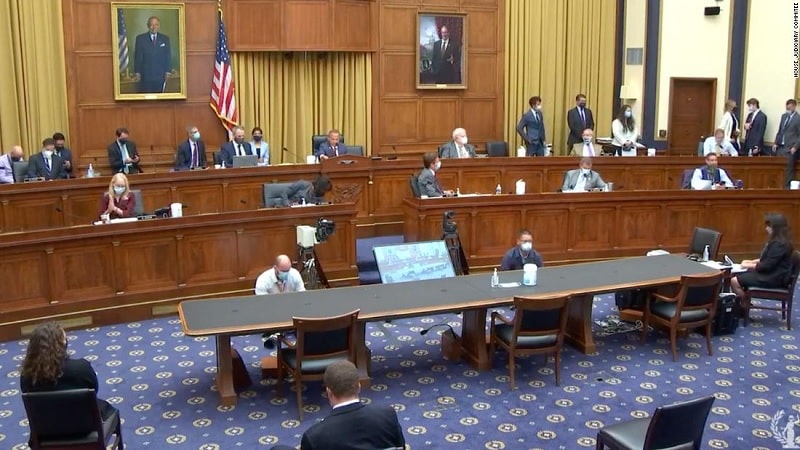
The newly constituted House Committee on Oversight and Accountability dedicated its first hearing of the 118th Congress on Feb. 1 to investigating fraud in the distribution of Federal COVID-19 relief funds, and committee leadership said that focus will continue down the road.
Committee Chairman James Comer, R-Ky., called for strong oversight of fraud stemming from three pieces of legislation featuring large-scale pandemic relief: the CARES Act, the Consolidated Appropriations Act, and the American Rescue Plan Act.
The committee’s hearing this week was colored by high-profile official reports of widespread fraud in some relief programs.
Among those are a Government Accountability Office (GAO) report claiming that state unemployment insurance (UI) programs – run with assistance from the Labor Department (DOL) – during the pandemic dished out more than $60 billion in fraudulent payments.
Additionally, on Monday, the Pandemic Response Accountability Committee (PRAC) said it identified more than $5 billion in fraudulent loans issued by the Small Business Administration’s Paycheck Protection Program and the COVID-19 Economic Injury Disaster Loan program.
“We’re having our first hearing on waste, fraud, and abuse in pandemic spending programs. We will hold many more of these hearings on this important issue,” Rep. Comer pledged.
“We owe it to the American people to get to the bottom of the greatest theft in American taxpayer dollars in history,” he said. “We must find out where this money went, how much ended up in the hands of fraudsters, and what can be done to ensure it never happens again.”
U.S. Comptroller General Gene Dodaro, who oversees GAO and was a witness at the hearing, said it will be some time until the full dollar amount of pandemic fraud can be determined since investigations are currently ongoing.
“This is going to go on for a while,” Dodaro said. “There are definitely indications of widespread fraud, but it’s impossible to estimate right now what the full extent of it will be.”
He did estimate that the programs approved by legislators have $157 billion in unspent pandemic relief funds.
Dodaro said Federal agencies should have been much better prepared to mitigate fraud in those programs – especially if they had implemented GAO’s Fraud Risk Framework. He also urged Congress to put forward legislative actions to increase transparency and accountability on future Federal spending.
“Unless we make these changes, we’re not better prepared” for further emergencies requiring assistance and relief, he said.
Michael Horowitz, chair of the PRAC, called on Congress to implement additional funding to the Pandemic Analytics Center of Excellence. The data platform was used by PRAC to uncover $5.4 billion in fraudulent loans, but it has a sunset date of Sept. 30, 2025.
In addition to this week’s PRAC findings, Horowitz also noted that the Small Business Administration handed out $3.6 billion to people who should have, at a minimum, undergone a second screening before they received a check from the Federal agency.
Concern Over UI Fraud
Lawmakers from both sides of the aisle expressed concerns with the amount of fraud that took place in the UI program, despite the $2 billion that was sent to state and local governments to modernize their systems.
The witnesses also agreed that the UI system needs to be fixed.
Horowitz said that states’ UI systems do not speak to each other, or the DOL, because they operate at a local level. PRAC found what he labeled as a “basic issue” in the fraud landscape: one Social Security number was used in 29 different states to obtain pandemic relief funds.
“That shouldn’t be able to happen with the use of modern technology,” Dodaro reiterated.
Both Dodaro and Horowitz agreed that Congress needs to step in to help states prevent further UI theft by updating their systems.
“The systems have to be modernized. There are too many legacy systems. Some of the states’ systems go back to the ‘70s,” Dodaro said.
“Money needs to be used to modernize IT systems,” Horowitz said. “It’s different state to state. Some states have older systems than others, but it seems that one of the first things that has to happen is the funding needs to be used to modernize antiquated state systems.”
